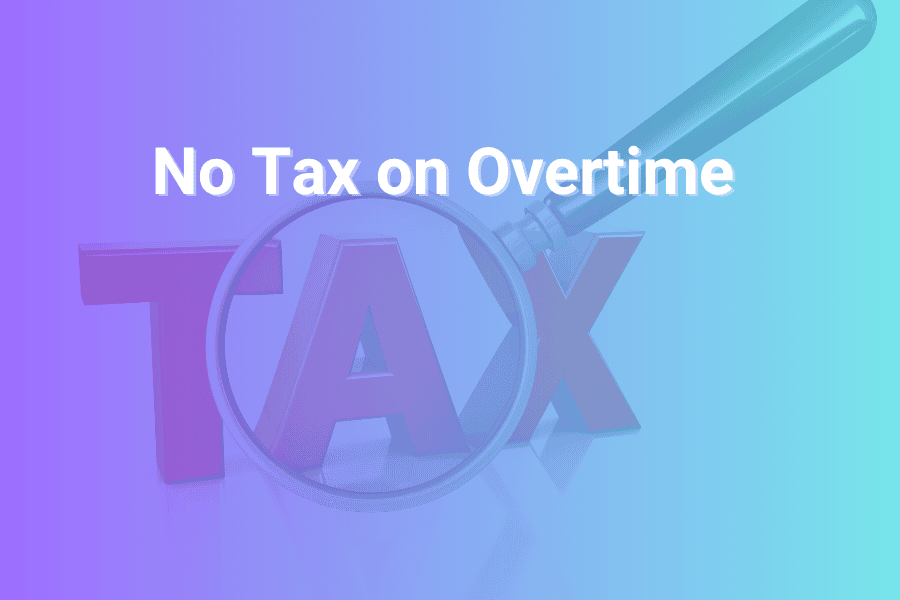
Overtime pay has always been a significant part of many workers’ income, especially those in industries where extended hours are common. However, changes to tax laws, set to take effect in 2025, are bringing good news for employees who regularly work overtime: the elimination of federal income taxes on overtime pay.
This change promises to provide relief to millions of U.S. workers. In this article, you will learn everything you need to know about the new “No Tax on Overtime” law, including eligibility, the impact on your paychecks, and what you can expect as a result of these changes.
What Does No Tax on Overtime Mean?
Starting in 2025, under the One Big Beautiful Bill Act (OBBBA), workers who receive overtime pay will no longer face federal income taxes on those earnings. Overtime pay refers to wages earned beyond the standard 40-hour workweek, where employees are typically paid time-and-a-half their regular rate. The change in tax law means that employees who receive overtime pay will benefit from this tax exemption, putting more money in their pockets.
Who Is Eligible for the Overtime Tax Exemption?
While the new law applies to many U.S. workers, eligibility is subject to certain conditions. Here’s a closer look at who qualifies for the exemption:
- Hourly Employees: Workers who receive overtime based on an hourly wage are the primary beneficiaries. These employees often work in sectors like retail, healthcare, manufacturing, and service industries.
- Salaried Employees: While salaried employees can also qualify, they must meet specific criteria outlined by the law. In most cases, their primary role should involve non-exempt duties and not managerial responsibilities.
- Income Limits: The exemption applies to individuals who earn under a specific threshold. For single taxpayers, the overtime earnings tax exemption is limited to $150,000 per year. For married couples filing jointly, the income cap is set at $300,000.
How Does the Tax Exemption Work?
The change means that overtime pay will be excluded from federal income tax calculations, allowing workers to take home more of their earned income. This tax exemption is applicable only to the overtime portion of the pay. For example, if an employee normally works 40 hours a week and receives 10 hours of overtime, the earnings from those 10 hours will not be subject to federal income tax. However, the regular wages for the first 40 hours will still be taxed as usual.
Importantly, this exemption does not apply to other types of deductions such as Social Security, Medicare, and state income taxes. These will remain unchanged.
How Will the Exemption Be Implemented?
The exemption will be implemented via a change to the way overtime pay is reported on W-2 forms. Employers will be required to calculate the overtime portion of an employee’s pay separately and exclude it from federal income tax withholding. The process may differ slightly from company to company, but workers can expect to see the change reflected on their paychecks after January 1, 2025.
In addition, workers will need to file their taxes normally but will be able to claim their overtime earnings as tax-exempt on their tax returns. It’s important to keep track of overtime hours worked and verify that the amounts listed on your W-2 forms reflect the changes.
What’s the Impact on Employees?
The elimination of taxes on overtime pay will have several positive effects for employees:
- Increased Take-Home Pay: The most immediate benefit will be an increase in net earnings. Employees who regularly work overtime will see their paychecks grow, providing them with more disposable income.
- Less Bureaucratic Hassle: Since overtime pay will no longer be taxed, employees will spend less time and energy figuring out their tax situation. This is especially true for those who rely heavily on overtime to meet their financial goals.
- Encouragement to Work Overtime: For some workers, the absence of federal taxes on overtime pay may encourage them to take on more hours. Knowing they will retain more of their earnings can serve as an incentive.
How Does This Affect Employers?
Employers must also adjust to the new law. They will be required to calculate and report overtime pay separately for tax purposes. This may involve adjusting payroll systems to account for the tax-exempt status of overtime. However, the change could simplify some aspects of payroll processing since employees will no longer be taxed on overtime earnings.
Employers must also stay informed about any state-specific tax implications since this exemption only applies to federal income tax. Some states may continue to tax overtime earnings, requiring employers to adjust accordingly based on the worker’s residence.
What About Tips and Other Forms of Pay?
The same principle applies to tips as to overtime pay. In many industries like hospitality, workers receive tips that form a substantial part of their income. Some of the proposed legislation, like the One Big Beautiful Bill Act, also includes measures for tax exemptions on certain tips. However, this remains separate from the overtime tax exemption, and workers should stay updated on specific tip-related changes.
Why This Change Matters for U.S. Workers
This shift in tax policy is significant for a few reasons:
- Relief for Low and Middle-Income Workers: Overtime pay has long been a crucial source of income for workers in various industries. Removing taxes from overtime means a higher net income for employees, many of whom work extra hours to make ends meet.
- More Disposable Income: For employees in lower to middle-income brackets, this policy change will help to alleviate some of the financial strain caused by inflation and rising living costs. With the extra earnings, workers may feel more financially secure and confident in their budgeting.
- Impact on Job Market Dynamics: For some businesses, the tax exemption on overtime pay could encourage workers to accept more overtime shifts, potentially increasing overall productivity and enhancing the workforce’s willingness to take on additional hours. However, it may also create logistical challenges for employers who rely on part-time or hourly workers.
Challenges to Be Aware Of
While the no-tax rule on overtime pay brings significant benefits, it’s essential to consider potential drawbacks:
- State Tax Variations: As mentioned, state tax laws may not align with federal policies. Some states may still tax overtime, leaving workers with a mixed tax experience.
- Overtime Abuse: Employers may find ways to maximize overtime hours for employees, potentially causing burnout or unfair work expectations. It’s essential for workers to ensure they’re not being taken advantage of in the name of overtime pay.
Conclusion
The new federal law that eliminates taxes on overtime pay is a game-changer for millions of U.S. workers, offering a welcome financial boost for those who regularly work extra hours. Starting in 2025, employees will no longer face federal income tax on overtime earnings, which could result in increased take-home pay and better financial security for many.
As always, workers should be proactive about understanding how these changes will affect their paychecks and tax filings to ensure a smooth transition. This change marks a positive step toward easing the tax burden on workers, allowing them to benefit more directly from the extra hours they put in on the job.
